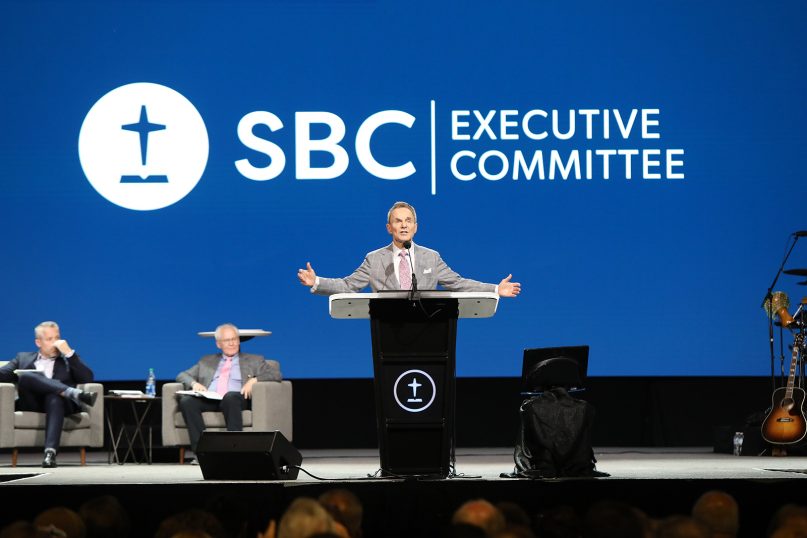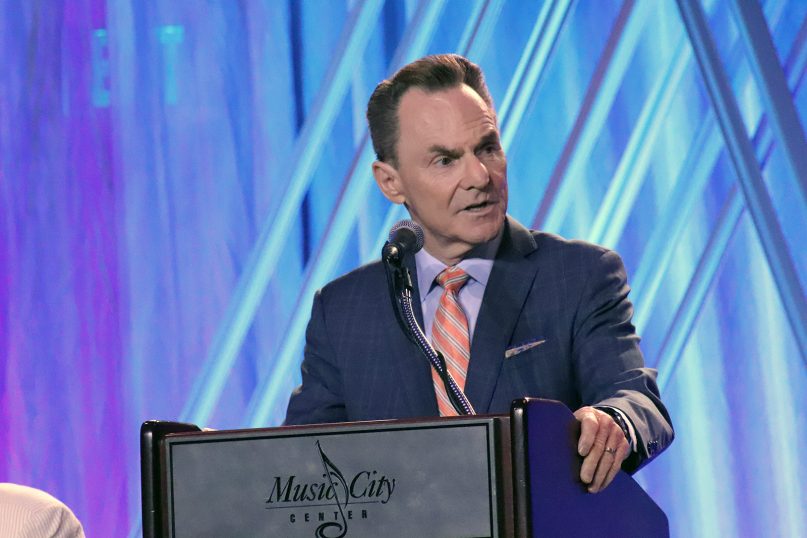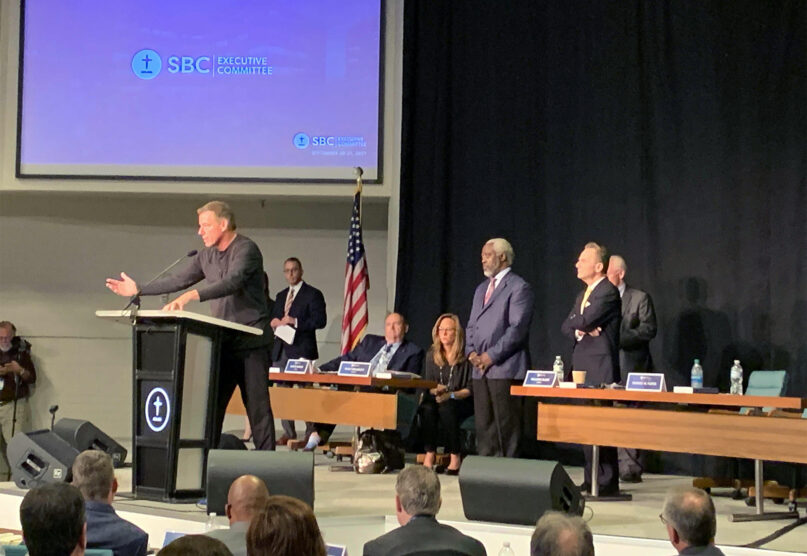How the ‘apocalyptic’ Southern Baptist report almost didn’t happen
A recently released report detailed how Southern Baptist leaders mistreated abuse survivors and tried to protect their institutions. The investigation that led to the report almost died numerous times.
By Bob Smietana | Religion News Service
For three minutes last summer, a call to investigate how Southern Baptist leaders have dealt with sexual abuse was dead in the water.
Then a little-known denominational bylaw and a pastor from Indiana saved it.
“I just had to do it,” said Todd Benkert, pastor of Oak Creek Community Church in Mishawaka, Indiana. “It was me or nobody.”
About 15 minutes into a morning business session at the Southern Baptist Convention’s June 2021 annual meeting in Nashville, Tennessee, Southern Baptist leaders announced that a motion to set up an independent sex abuse investigation was being tabled.
Because the motion dealt with the internal workings of an SBC entity — in this case, the denomination’s Nashville-based Executive Committee — denominational officials, relying on bylaw 29 of the SBC’s constitution, decided to refer the motion to that entity.
In other words, the Executive Committee would be put in charge of investigating itself.
Then-President J.D. Greear was ready to move on when Benkert stood up at a microphone with a motion of his own, based on another section of bylaw 29.
“I would like the opportunity to make a motion to overrule the Committee on Order of Business at the appropriate time,” he said.
Benkert’s motion was met with applause. Then a second, and then almost all of the 15,000 local church delegates, known as messengers, raised their yellow voting cards in the air — far more than the two-thirds majority needed to overrule the committee.
Those messengers would later approve the abuse investigation. A report from that investigation, released this week, would show that for decades Executive Committee leaders had done everything in their power to protect the institution from liability.

“In service of this goal, survivors and others who reported abuse were ignored, disbelieved, or met with the constant refrain that the SBC could take no action due to its polity regarding church autonomy — even if it meant that convicted molesters continued in ministry with no notice or warning to their current church or congregation,” the report concluded.
The report, compiled by outside investigation firm Guidepost Solutions, was an “apocalypse,” according to former SBC ethicist Russell Moore, who had been hounded out of the denomination in part because of his support for survivors of abuse. Al Mohler, president of the Southern Baptist Theological Seminary, called it a sign of God’s judgment on the nation’s largest Protestant denomination.
Abuse survivors saw the report as vindication of the warnings they had given for years. “We told the truth,” said Tiffany Thigpen, an abuse survivor and advocate, after the release of the report.
The existence of the abuse report is a triumph of congregational polity — the idea that people in the pews should have the final say, rather than leaders — aided by the minutiae of church bylaws and the fierce determination of survivors and advocates to say enough was enough.
And yet, the abuse investigation almost never happened.
From the moment it was proposed, Executive Committee leaders actively tried to shut it down, or if that was not possible, to defang the report so the committee’s secrets would never be known.
Even with overwhelming approval from messengers for the investigation, Executive Committee members spent tens of thousands of dollars to resist waiving attorney-client privilege, which would allow investigators to review communications between SBC lawyers and committee members. They also tried to control the final shape of the investigation’s report and warned that if their secrets were revealed, the SBC would be ruined.
The story of the report begins in the fall of October 2019, when Rachael Denhollander, an attorney and advocate whose testimony helped send former USA Gymnastics doctor Larry Nasser to jail, spoke at the SBC Caring Well conference on addressing sexual abuse. During the conference, led by Moore, Denhollander criticized SBC leaders for mistreating a survivor named Jen Lyell.

That led to a backlash from leaders like Ronnie Floyd, then president of the Executive Committee. In a meeting with Moore after that conference, Floyd said “I am not concerned about anything survivors can say,” according to a recording of the meeting.
“I am not worried about that,” he said. “I’m thinking the base. I just want to preserve the base.”
Moore later wrote to trustees of the Ethics and Religious Committee about his clashes with other Southern Baptists, saying he had been criticized and harassed for supporting abusers and saying the culture of SBC leaders was unsafe for abuse survivors. His letter became public when it was leaked to Religion News Service.
After reading Moore’s letter, Grant Gaines, a pastor from Murfreesboro, Tennessee, said he sent a text to his friend Ronnie Parrott, a pastor in North Carolina, saying the Executive Committee “had some explaining to do.”
“He said to me, ‘Yeah, but who is going to get them to explain it?” Gaines said in an interview.
The two decided to draft a motion for the SBC’s annual meeting to set up an investigation to do just that. They consulted with experts on SBC governance to make sure the motion was in order and talked to advocates about what was needed.
Among the suggestions: getting access to communication with SBC lawyers. Those communications would show what Southern Baptist leaders were up to.
David French, an author and lawyer who has written about abuse, said that in crisis, churches and other Christian groups often delegate their decision-making to their lawyers. Those lawyers generally think about preserving the institution first.
“The attorneys don’t have a fiduciary duty to the gospel,” he said. “And they don’t have a fiduciary duty to preserve the integrity of the church. What they have is a fiduciary duty to the corporate entity that retains them and to the preservation of that entity.”
French called the SBC decision to waive privilege as “extraordinary” for churches. “It was one of the strongest signals I’ve seen from a church that they want to know the truth,” he said.
From the beginning, Gaines said, Executive Committee members were against any kind of independent investigation or the idea of waiving privilege. Days before the start of the SBC annual meeting in June of 2021, the committee hired Guidepost Solutions to review its processes in dealing with abuse.
“The SBC Executive Committee commits to providing full support and transparency to Guidepost Solutions, including making individuals available for interviews and providing relevant documents,” the committee said in a statement at the time.
That arrangement would have given Floyd and other leaders control of the investigation and any report that came out of it. When a member of the Executive Committee called for that investigation to be expanded, the idea was shot down at a meeting of the committee in June.

When Gaines and Parrott decided to go ahead with their motion, Floyd and another staffer met with them less than an hour before they were set to make the motion, asking them to change it. In particular, Gaines said, they wanted to remove any mention of waiving privilege.
Gaines and Parrott refused.
When Gaines learned a day later that the motion would likely be referred to the Executive Committee, he made a speech from the floor of the convention, this time urging the Executive Committee to do the right thing.
“Because the Executive Committee is the one under investigation, the Executive Committee can’t be the ones that control the investigation,” he said. “That would be the wrong way to do this.”
Greear was sympathetic to Gaines’ concerns. As president, Greear had been a strong advocate for abuse survivors and had urged the denomination to take sexual abuse seriously in the wake of a 2019 investigation of the SBC by the Houston Chronicle that found hundreds of cases of abuse. He had set up a task force to create resources to help churches prevent abuse and care for survivors. Still, the bylaws seemed to dictate that the issue should be referred.
“Under the convention’s rules, these motions are referred to as indicated by the Committee on the Order of Business,” Greear determined at the time.
The motion’s fate seemed sealed.
At the time, Gaines had no idea that messengers could overrule the decision to refer his motion. He also did not know Benkert was waiting in the wings. A pastor for more than two decades, Benkert said he had been at other church meetings where decisions had been overruled. So he made a split-second decision to get to a microphone.
“If I had not got up, it was dead,” he said. “I’m glad God used me.”
Getting the motion passed proved to be only half the battle. Though Floyd told messengers the committee respected them and would not oppose the motion, soon after the meeting he went to work to regain control of the investigation.
In public statements and letters to Executive Committee members ahead of their fall meeting, where they would vote on whether to waive privilege, Floyd tried to dissuade them.

“We should seek to understand these best practices before we decide which practices to apply,” he wrote in a letter to committee members. “For example, if we do this incorrectly, will we be as a nonprofit organization, denying our rights to effective counsel in the middle of litigation?”
The Executive Committee would eventually hold three hotly contested meetings over the issue of waiving privilege, with a vote to do so failing repeatedly.
A group of committee members, including Joe Knott, Rod Martin and other members who have ties to the Conservative Baptist Network, which says the SBC has become too liberal, adamantly opposed waiving privilege, saying it would lead to the convention’s ruin.
At one point, Rob Showers, a committee member and attorney from Virginia, said the committee could not legally follow the will of the messengers and waive privilege.
“I’m saying the motion that says for us to violate our fiduciary duties would not be legal,” he said.
Mississippi Baptist pastor Adam Wyatt disagreed. He voted for waiving privilege last fall, a decision he stands by. Following the will of the messengers was the right thing to do, he told RNS in an interview.
After one of the stalled meetings, survivor Jen Lyell reached out to a number of Executive Committee members, inviting them to an informal Zoom discussion about the importance of having an independent and thorough investigation.
“It is still not too late to do the right thing,” she wrote. “All it takes is a willingness to ask the questions to get the information needed to ensure the facts are known, then act accordingly.”
The committee approved the waiver in a third meeting, on Oct. 5. But even then, opponents tried one more gambit. After the vote was taken, Idaho pastor Jim Gregory appealed to the chair of the meeting, saying the committee’s decision was out of order.
His appeal was denied.
After the meeting, 16 committee members resigned in protest. Floyd quit as well, saying his reputation was at stake. After the Guidepost report was published, Floyd told Baptist Press he stood by his actions, saying he was concerned with good governance, not obstruction. He pointed to comments he made in his resignation letter about his disdain for abuse and about the hard work of Executive Committee trustees.
“One of the most grievous things for me personally has been the attacks on myself and the trustees as if we are people who only care about ‘the system,’” he wrote in that letter. “Nothing could be further from the truth.”
Denhollander said the Guidepost report shows the importance of waiving attorney-client privilege when investigating abuse. Many of the most important facts in the report came from communications with lawyers, she said. Those facts would have remained secret if attorney-client privilege had not been waived.
“Southern Baptists would have been kept in the dark about what was really going on in their convention without the waiver of privilege,” she said.

Bruce Frank, who chaired the task force that hired Guidepost, said the report revealed why some Executive Committee staffers and members did not want communications with lawyers made public. Not everyone who voted against waiving privilege had nefarious intent, he said. But some knew what they were hiding.
For example, he said, the report revealed Executive Committee staff kept an informal list of abusers while claiming the SBC could not set up a database to track abusers, something he called beyond belief.
If privilege had not been waived, then the task force would have told Guidepost to go ahead with its work. But few people would have trusted the report such an inquiry produced.
“People would have known that you had the proverbial fox protecting the hen house,” he said.
Lyell, a former vice president for Lifeway Christian Resources, the Southern Baptist publisher, whose life and career fell apart after she made her abuse experience public, doubts anything will change, even after the report. Lyell supported the abuse investigation but said it revealed only the tip of the iceberg.
“We have not fixed anything,” she said.
She also believes the convention is inherently flawed. The convention, she said, is a billion-dollar operation, overseen mostly by volunteer trustees and with almost no accountability. The Executive Committee, for example, which oversees the business of the SBC between its annual meetings, is run by a few dozen staff and about 80 volunteer trustees.
There’s too much money from too many people flowing into the hands of a few people, who are overseen by volunteers, she said.
“That cannot be fixed,” she said, adding that any reforms put in place at the upcoming SBC meeting in Anaheim, California, will be too little, too late.
“If they think they can go to Anaheim and change the script or throw in some prayer, they have lost their minds,” she said. “I guarantee you that the Jesus who’s in the Scriptures would shut Anaheim down. Period.”








